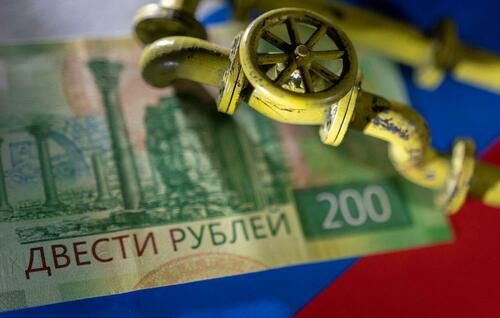
Russian gas producer Gazprom PJSC proposed to expand the rubles-for-gas scheme to liquified natural gas (LNG), the Interfax news agency quoted Kirill Polous, head of Gazprom's long-term development department.
Polous, who spoke at a State Duma Energy Committee round table at which Russia's Energy Strategy for the next three decades was discussed, proposed that customers pay rubles for its LNG exports.
"Pipeline gas is sold to European counter-parties from unfriendly states for rubles, but such measures don't apply to LNG," he told the State Duma Energy Committee. "Thus, there is already some kind of currency competition between Russian pipeline gas and LNG supplies."
President Putin has declared that all "unfriendly" countries buying Russian natural gas fulfill their payments in roubles. This has been a significant problem for the European Union, which gets an estimated 40% of its NatGas from Russia.
Russia already runs the ruble-for-gas payment system for the natural gas it sends to Europe via pipeline. Gazprom has already stopped supplying gas to countries and companies refusing to bow to the rubles demand—Poland, Bulgaria, Finland, as well as customers in the Netherlands, Denmark, and Germany.
Many European companies have set up accounts in rubles at Gazprombank to comply with Putin's demand. Nevertheless, Gazprom slashed pipeline supply to Germany and Italy in the middle of June, claiming "technical reasons" and saying Western sanctions prevent a gas turbine being repaired in Canada from returning to Russia in time. Italy's Prime Minister Mario Draghi dismissed this explanation, describing the Russian reasons for the reduced flows as "lies."
With low supply from Russia and Nord Stream up for a two-week maintenance this month, Europe scrambles to fill gas storage in time for the winter. -OilPrice.com
The move has made the rouble the world's best-performing currency this year, despite Western sanctions aimed at crippling Moscow.
Polous' proposal comes as Russia seized operations of the Sakhalin-2 LNG plant last week. Putin has signed an order to create a new firm to take over Sakhalin Energy Investment Co.
Russia accounts for 8% of the global LNG supply, with the bulk of it consumed in Asia. In Europe, Spain is one of the largest buyers of Russian LNG.
Moscow could easily extend the rouble scheme to other exports, including oil, grain, fertilizers, coal, metals, and other key commodities, boosting the currency's value and bringing in more cash. A larger amount of roubles demanded in international markets to purchase Russian commodities is Moscow's way of challenging US dollar dominance in global trade.
Russian gas producer Gazprom PJSC proposed to expand the rubles-for-gas scheme to liquified natural gas (LNG), the Interfax news agency quoted Kirill Polous, head of Gazprom’s long-term development department.
Polous, who spoke at a State Duma Energy Committee round table at which Russia’s Energy Strategy for the next three decades was discussed, proposed that customers pay rubles for its LNG exports.
“Pipeline gas is sold to European counter-parties from unfriendly states for rubles, but such measures don’t apply to LNG,” he told the State Duma Energy Committee. “Thus, there is already some kind of currency competition between Russian pipeline gas and LNG supplies.”
President Putin has declared that all “unfriendly” countries buying Russian natural gas fulfill their payments in roubles. This has been a significant problem for the European Union, which gets an estimated 40% of its NatGas from Russia.
Russia already runs the ruble-for-gas payment system for the natural gas it sends to Europe via pipeline. Gazprom has already stopped supplying gas to countries and companies refusing to bow to the rubles demand—Poland, Bulgaria, Finland, as well as customers in the Netherlands, Denmark, and Germany.
Many European companies have set up accounts in rubles at Gazprombank to comply with Putin’s demand. Nevertheless, Gazprom slashed pipeline supply to Germany and Italy in the middle of June, claiming “technical reasons” and saying Western sanctions prevent a gas turbine being repaired in Canada from returning to Russia in time. Italy’s Prime Minister Mario Draghi dismissed this explanation, describing the Russian reasons for the reduced flows as “lies.”
With low supply from Russia and Nord Stream up for a two-week maintenance this month, Europe scrambles to fill gas storage in time for the winter. –OilPrice.com
The move has made the rouble the world’s best-performing currency this year, despite Western sanctions aimed at crippling Moscow.
Polous’ proposal comes as Russia seized operations of the Sakhalin-2 LNG plant last week. Putin has signed an order to create a new firm to take over Sakhalin Energy Investment Co.
Russia accounts for 8% of the global LNG supply, with the bulk of it consumed in Asia. In Europe, Spain is one of the largest buyers of Russian LNG.
Moscow could easily extend the rouble scheme to other exports, including oil, grain, fertilizers, coal, metals, and other key commodities, boosting the currency’s value and bringing in more cash. A larger amount of roubles demanded in international markets to purchase Russian commodities is Moscow’s way of challenging US dollar dominance in global trade.






